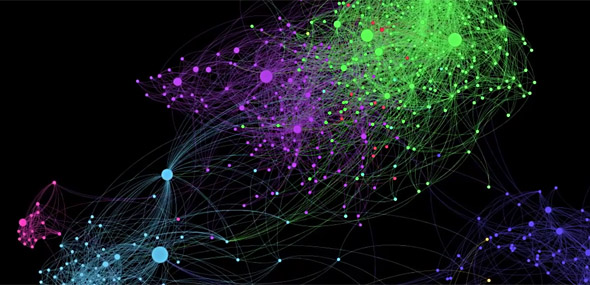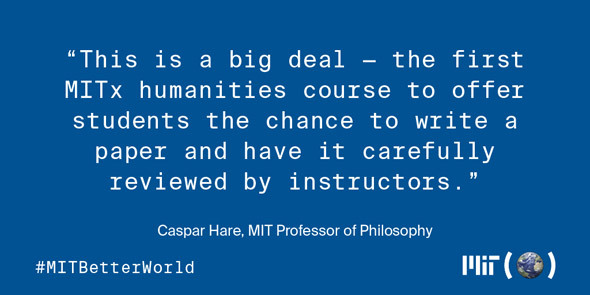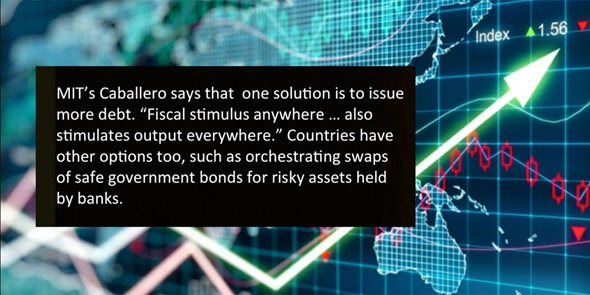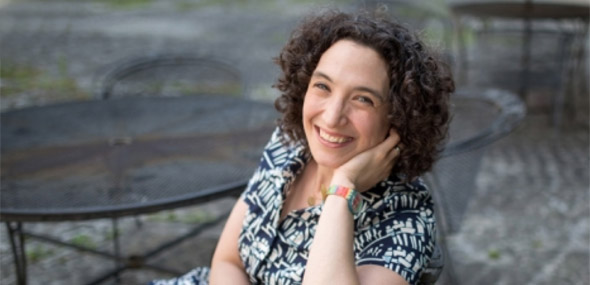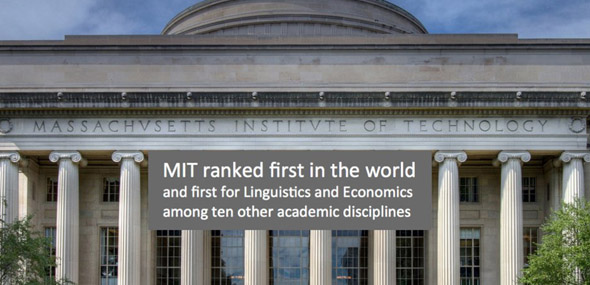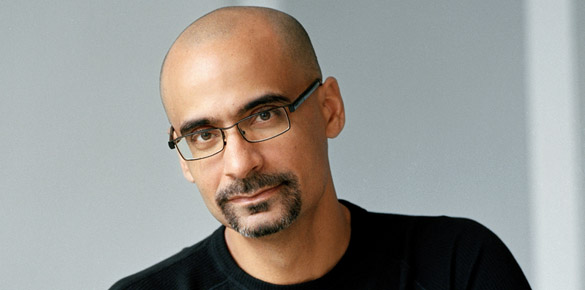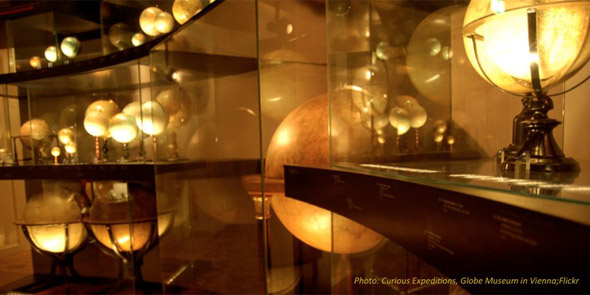Said and Done
September 2016 Edition
Published by the Office of the Dean
MIT School of Humanities, Arts, and Social Sciences

QUOTABLE
"Humanity faces urgent challenges — challenges whose solutions depend on marrying advanced technical and scientific capabilities with a deep understanding of the world’s political, cultural, and economic complexities."
— L. Rafael Reif, President of MIT
FEATURE | ON MOOCS
How to make a MOOC at MIT
If you are a member of the MIT faculty, the Office of Digital Learning (ODL) is your central resource for digital learning initiatives and online education. ODL is a community where faculty can collaborate and share digital learning experiences. They offer instructional and technical consultation as well as a wealth of tools and resources.
MITx Resources for MIT Faculty | Grant Program for Making a MOOC
MITx is channeling more of its financial and staffing resources toward strategic proposals that align with institutional and departmental digital learning priorities while shifting away from one-off projects. The program therefore encourages departments to develop a digital learning strategy if they do not already have one. Each department’s digital learning strategy will be different, specific to its curricular goals.
Develop a Department Strategy for Digital Learning
SOCIAL SCIENCES
New SHASS MITx MOOC | Data Analysis for Social Scientists
Taught by Professor of Economcis Esther Duflo and Senior Lecturer in Economics Sarah Ellison, this course teaches methods for harnessing and analyzing data to answer cultural, social, economic, and policy questions.
Introductory Video | Course free on edX
PHILOSOPHY
Caspar Hare's online philosophy course solves a major issue in MOOC design
Hare's "Introduction to Philosophy" will enable students to write papers and have their work reviewed and graded by professional philosophers. “Listening to lectures and reading books is great," Hare says, "but philosophy is all about taking complex ideas and organizing them in a simple way. You learn by writing.” Inside Higher Education writes that this course “has solved a real problem in the MOOC world—of quality feedback and engagement—and has done so in a way that sustains the ability to scale.”
Story | About the Course
RESEARCH
POLITICAL SCIENCE
What makes for a well run election? | Charles Stewart III
In August, the Pew Charitable Trusts released the latest edition of its Elections Performance Index (EPI) with data from the 2014 midterm election. In ElectionLineWeekly, MIT’s Charles Stewart — a prime force behind the EPI — talks about what the research means for American election administration now and going forward. There's good news: Stewart says "the administration of elections in the U.S. continues to improve, slowly but surely."
Full Commentary at ElectionLineWeekly
ECONOMICS | POVERTY ACTION LAB
J-PAL announces winners of the health care delivery innovation competition
Four organizations will partner with J-PAL North America to evaluate substance abuse treatment, care integration, social-service delivery, and patient-engagement programs. The Innovation Competition is a part of J-PAL’s U.S. Health Care Delivery Initiative, which also supports randomized evaluations of a number of other programs across the country.
Story | The U.S. Health Care Delivery Initiative
SECURITY STUDIES
Study: New ways to influence North Korea | Jim Walsh
Coinciding with Pyongyang's latest missile launch, a report by Walsh and co-author John Park, “Sanctions Effectiveness and Unintended Consequences,” recommends that the U.S. work more closely with China to influence Kim Jong Un regime and counter illicit North Korean businesses inside China, to extend China's existing domestic anti-corruption campaign to North Korean entities, and to enforce maritime law.
Story | PDF of Report | 3-min video
ECONOMICS
The safety trap
Lack of secure investments is hindering growth globally. MIT researchers propose a solution. “The shortage of safe assets is a global phenomenon,” says Caballero, who notes that national remedies for the safety trap cross borders as well. “Policies that increase the net supply of safe assets somewhere are output-enhancing everywhere,”
Story by Peter Dizikes, MIT News
COLLABORATION: SA+P and SHASS
A game about real estate and the public good
A collaboration between the Department of Urban Studies and Planning and the MIT SHASS Game Lab has produced an ingenious game that enables players to create models of socially responsible real estate ventures.
Story by Jintai Li
LITERATURE
Your child, the literary talent
Literary scholar Marah Gubar, who studies the creative powers of kids, is engaged in a research project to isolate and compare some of the most common ways we think about the nature of childhood. She aims for the research to be valuable to many people, including child development specialists, teachers, librarians, psychologists, and the general public.
Story by Peter Dizikes, MIT News | Gubar webpage
“It really matters how adults think and talk about what it means to be a child.... [childhood] “is not just biological; it’s also a social and cultural matter, so it changes over time, across cultures, and in different social classes.”
— Marah Gubar, Associate Professor of Literature
FEATURE | 100TH ANNIVERSARY OF THE PULITZER PRIZES
MIT's Pulitzer Prize Winners
2016 marks the 100th awarding of the Pulitzer Prizes, given each year for works of distinguished excellence in the genres of journalism, letters, drama, and music. As part of the ongoing anniversary celebrations this fall, MIT SHASS is pleased to present a gallery of the Institute's Pultizer Prize recipients. Members of our community have been awarded Putlizer Prizes for fiction, music, journalism, and history.
Gallery of MIT Pulitzer Prize Winners
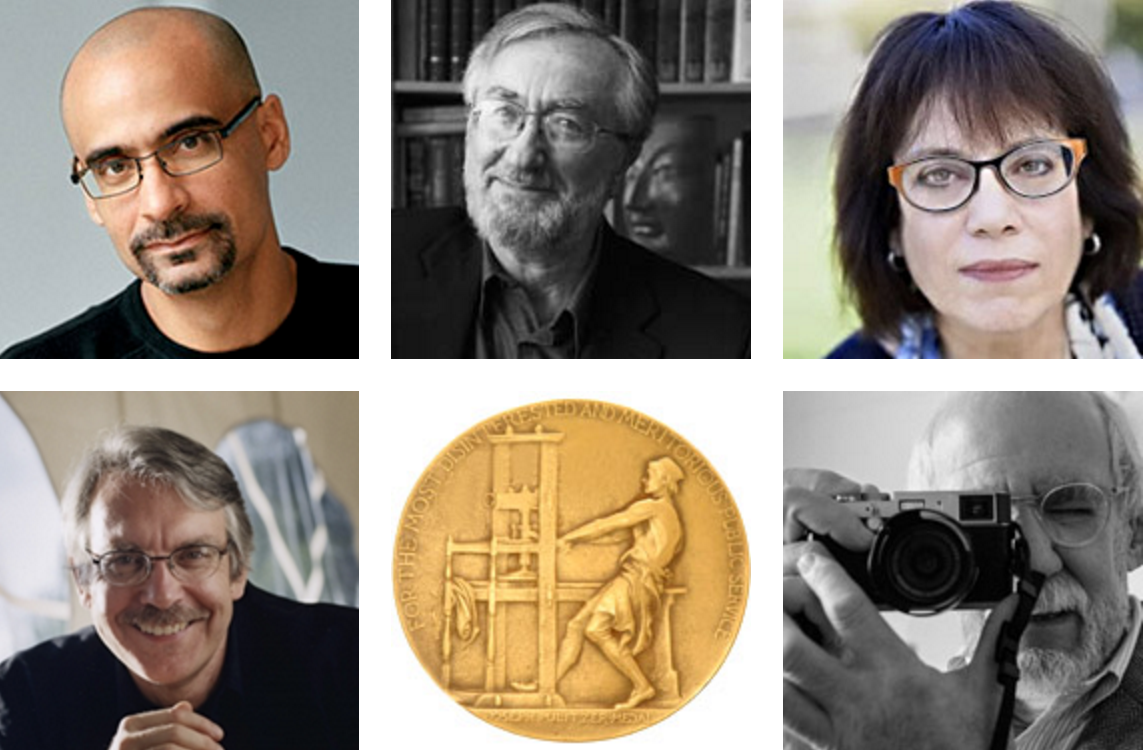
L to R: Junot Díaz, Writing; John Dower, History; Deborah Blum, Knight Science Journalism Program; John Harbison, MIT Music; B.D. Colen, Comparative Media Studies
FEATURE | MIT SHASS DOCTORAL STUDENTS
PHILOSOPHY
Seeking big answers about art — via philosophy and biology | Rebecca Millsop
PhD student Rebecca Millsop uses philosophy — and biology — to take on contentious questions about how we define art. “You have to consider that art is a very real part of our lives and societies, she says. "We have art institutions, we have funding for the arts, everyone has an idea of what it is. [Works of art] are real things that interact with real people in the world, so we should care about coming up with satisfactory definitions, or at least theories.”
Story by Catherine Caruso, MIT News
ECONOMICS
A world of questions | Nils Wernerfelt
Wernerfelt deploys the tools of economics to address his questions about the world. Last year, he received the opportunity to collaborate with researchers at Facebook, and is currently embedded there, collaborating with computer scientists, sociologists, and statisticians from around the world on questions centered around human behavior.
Story by Cartherine Caruso, MIT News
POLITICAL SCIENCE
From Babylon to Baudelaire and back | Marsin Alshamary
In exploring the role of clerics in the Shi’a world, political science PhD student Marsin Alshamary notes that “Religious leaders exist everywhere — whether as elites in the hierarchy or as local leaders, at the community level.” Her dissertaion focuses on the role of individual religious leadership in the context of civil wars and contentious politics.
Story by Sarah Baldwin
FEATURE | OCW EDUCATOR
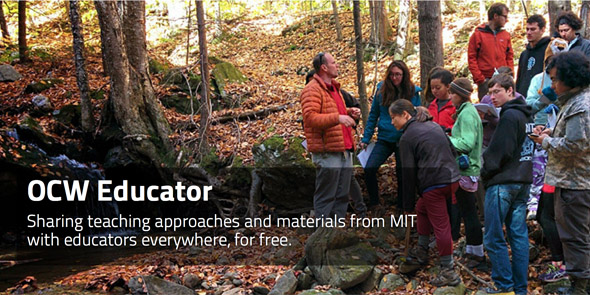
Resources for Innovation in Education | OCW Educator
OCW Educator is a venue for showcasing insights from MIT instructors about how and why they teach the way they do. The OCW team notes that many SHASS instructors have developed creative approaches to teaching, and invites inquiries from SHASS instructors about how they might participate in this new Educator portal. A number of recent SHASS courses on OCW now feature Instructor Insights, including Kurt Fendt’s CMS.633 Digital Humanities; David Thorburn’s 21L.011 The Film Experience; Steven Strang’s 21W.747 Rhetoric; and Sally Haslanger, Patricia-Maria Weinmann, and Brendan de Kenessey’s 24.191 Ethics in Your Life. OCW also shares information about courses via their well-read blog (80,000+ readers) and newsletter (245,000 subscribers).
More about the OCW Educator
HONORS AND AWARDS
SCIENCE WRITING
Tom Levenson's Hunt for Vulcan is a finalist for Royal Society Science Book Prize
The most recent book by science writing professor Thomas Levenson, The Hunt for Vulcan, has been short-listed for the 2016 Royal Society Insight Investment Science Book Prize, called “the Nobel Prize of science writing” by 2016 judge Bill Bryson.
More
SECURITY STUDIES
Barry Posen receives 2017 Lifetime Achievement Award
The award, given by the International Studies Association, recognizes a distinguished scholar in International Security Studies. The 2017 Distinguished Scholar Award recipient will be honored at a special panel at the ISA conference in Baltimore in February 2017. Posen's award is recognition for his many contributions to scholarship and teaching.
SSP website
MIT ECONOMICS AND LINGUISTICS
QS ranks MIT the world’s top university; Economics and Linguistics also 1st
MIT is ranked No. 1 for the fifth straight year; the MIT SHASS Departments of Economics and Linguistics are also ranked 1st in the world, along with ten other MIT disciplines.
Story
POLITICAL SCIENCE
Ariel White wins Heinz Eulau award
This award is given for the best paper published in the American Political Science Review in the previous year. White and her co-authors won for their article, “What Do I Need to Vote? Bureaucratic Discretion and Discrimination by Local Election Officials,” which highlights the issue of racial profiling by local officials and how this leads to systematic bias against minority citizens. The committee cited the substantive issue of the inquiry, which has far-reaching implications for the study of democracy and equity.
Story
COMPARATIVE MEDIA STUDIES / WRITING
Junot Díaz to receive Hispanic Heritage Award for Literature
MIT professor and Pulitzer Prize-winning author Junot Díaz will receive the award in Washington, D.C. on September 22, sharing the stage with award recipients, including Supreme Court Justice Sonia Sotomayor, who will receive the Foundation’s Leadership Award.
Full Story at CMS/W | Hispanic Heritage Foundation | Video interview with Díaz
“I am deeply honored to receive this award, to be included in extraordinary company of Justice Sonia Sotomayor and my other fellow honorees. As an immigrant myself, I hope that the award can bring attention to our heroic immigrant communities, who give so much for our country, and in particular to our undocumented students.”
— Junot Díaz, Rudge Professor of Writing at MIT
POLITICAL SCIENCE
Dean Knox wins John Williams Prize from Society for Political Methodology
The prize recognizes the best dissertation proposal in political methodology. Knox’s dissertation proposal, titled "Essays on Modeling and Causal Inference in Network Data," provides new tools for incorporating networks into several methodological traditions. Notably, he proposes a novel statistical model that has the potential to answer a large set of important questions.
More
POLITICAL SCIENCE
Nazli Choucri receives the 2016 Myron Weiner Award
“Professor Choucri is an outstanding scholar whom we are pleased to honor as this year's recipient of PDG’s Myron Weiner Distinguished Scholar Award.”
ISA website
HISTORY
Christopher Capozzola and colleague awarded grant for 2017 NEH Summer Institute
Capozzola and a colleague, historian Ann-Marie Gleeson, have been awarded a $172K grant by the National Endowment for the Humanities to host a summer institute for secondary educators on “Foreign Exchanges: The U.S. and the Wider World in the Twentieth Century.”
Information at NEH
IN THE MEDIA
MIT SHASS In the Media
For more of the many recent media stories about SHASS research and faculty, visit:
In the Media Section | September 2016
DEVELOPMENT ECONOMICS | J-PAL
When Women Win, Men Win Too | Esther Duflo
New York Times columnist Nicholas Kristof draws on research by MIT economist and J-PAL co-director Esther Duflo that reveals a relationship between high levels of diversity and high levels of economic growth.
Story at the New York Times
SECURITY STUDIES PROGRAM
3-Min video on North Korean nuclear test and security implications | Jim Walsh
In an illluminating video interview, SSP Research Associate Jim Walsh talks about DPRK's nuclear test, possible future sanctions from the U.N., security implications, and Korean leadership strategy.
Interview on CCTV
HEALTH CARE ECONOMICS
How do we know what really works in healthcare?
Amy Finkelstein, a professor of economics at MIT, discusses the use of random controlled trials (RCTs) to explore healthcare delivery — and the “accidental” RCT she discovered when Oregon expanded Medicaid.
Podcast on Freakonomics
SCIENCE, TECHNOLOGY, AND SOCIETY
Sherry Turkle makes her off-broadway debut
Or rather “Sherry Turkle,” played by Saturday Night Live alum Rachel Dratch, appears in James Graham’s play “Privacy,” at the Public Theater in NYC. The implicit question: If you’re embarrassed watching your online footprint splashed across an LED screen in front of three hundred strangers, do you really want it out there for the whole world to see?
Review at the New York Times | Review at The New Yorker | Story at MIT Slice
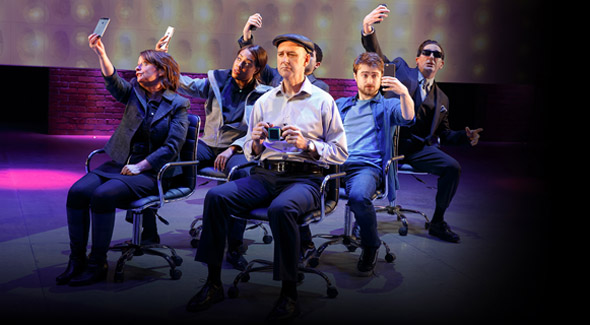
Scene from “Privacy,” at the Public Theater, NYC; photograph © Joan Marcus
STAY IN TOUCH
SHASS stories on MIT News
Bookmark this page
MIT SHASS social media
Facebook | Twitter
MIT-SHASS Publications Directory
Online portal to all MIT-SHASS publications
MIT Campaign for a Better World
Story | Join Us
Said and Done is published by the Office of the Dean
MIT School of Humanities, Arts, and Social Sciences
Editor, Designer: Emily Hiestand, Director, SHASS Communications
Publication Associate: Daniel Pritchard, SHASS Communications
Published September 14, 2016
About the MIT School of Humanities, Arts, and Social Sciences
MIT champions the power of STEM + SHASS for research and for educating great engineers, scientists, scholars, and citizens.
Making a better world — Generating solutions for the great challenges of our age requires both advanced technical and scientific knowledge and a deep understanding of the world's human complexities. MIT-SHASS researches and advances the cultural, political, and economic dimensions of innovation — the broad range of human realities, from deeply-felt cultural traditions to building codes to political tensions, in which science and technology issues are embedded.
Excellence — In 2015, MIT's Social Science disciplines were ranked first in the world, and MIT's Humanities and Arts disciplines were ranked among the top three worldwide.
Research with a global impact — The MIT-SHASS research portfolio is vast, including anthropology, comparative media studies, economics, history, international studies, languages, linguistics, literature, music and theater arts, political science, philosophy, security studies, and writing, including science writing.
Education that empowers — The School teaches every MIT undergraduate, empowering students with cultural and historical perspectives, and critical thinking and communication skills — to help them serve the world wisely and well. The School's seven graduate programs are all recognized as among the finest in the world.
Cultivating leaders — SHASS has a central role in international education at MIT, and in preparing students for leadership at home and on international teams. Through all their SHASS coursework, and in MISTI, the School's pioneering applied international education program, MIT students learn how to work, collaborate, and thrive in cultures around the globe.
